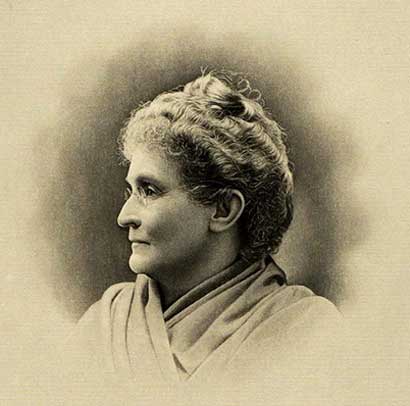“Dined with Dr. Wolcott”
Lavinia Goodell, October 17, 1879
Lavinia Goodell was acquainted with many pioneering women of her day, including Dr. Laura Ross Wolcott, Wisconsin’s first woman physician.

Laura Ross was born in Maine in 1826. She graduated from the Women’s Medical College of Pennsylvania in 1856 and was the third woman in the U.S. to earn a medical degree. (Janesville, Wisconsin gained a woman physician in 1878 when Dr. Clara Normington set up practice there.) Dr. Ross moved to Milwaukee in 1857, but was denied admittance to the Medical Society of Milwaukee County because she was a woman. She went to Paris in 1867, and sat in on lectures at the Sorbonne and worked in a hospital. She returned to Milwaukee and was admitted to the Milwaukee County Medical Society in 1869, in part due to the support of an older physician, Erastus Wolcott, whom she married that same year.
1869 was a busy year for Dr. Wolcott since in addition to being admitted to the Medical Society and getting married, she helped organize a woman’s rights convention in Milwaukee (Lily Peckham, who was an aspiring lawyer and later became a minister also participated in the convention) and was a founder of the Wisconsin Woman’s Suffrage Association, serving as its president until 1882.
The Milwaukee newspaper the Semi-Weekly Wisconsin, described the 1869 convention as follows:

The following month the Daily Milwaukee News reported on the formation of the Wisconsin Woman’s Suffrage Association. The article began:
The woman suffrage convention held in Milwaukee took the people of that beautiful city wholly by surprise. They seemed to have settled down into the belief that they were secure from an invasion of the “strong-minded” and were wholly unprepared for the brilliant coup d’etat which the woman suffrage advocates sprung upon them two weeks ago. “What?” said a staid, dignified elderly gentleman, “has the woman suffrage fuss got here? I declare I never expected that. I knew it had reached everywhere else, but I never thought it would get here!” Thus utterly surprised, they surrendered unconditionally. The convention was one of the most successful ever held.
The March 24, 1869 Daily Milwaukee News reprinted a letter detailing the convention that had been written by Elizabeth Cady Stanton and previously published in The Revolution. Mrs. Stanton declared that “Mr. and Miss Peckham and Dr. Laura J. Ross” “were the ruling spirits of the convention.” She described how one of the speakers, Rev. Mr. England, maintained that the Bible was opposed to woman’s equality and that men possessed physical superiority over women. Mrs. Stanton facetiously described Rev. England as “a small, thin, shadowy man, without much blood, muscle, or a very remarkable cerebral development” and said:
Unfortunately for him, the platform illustrated the opposite, and the audience manifested, over and over, by suppressed laughter, that they saw the contrast between the large, well-developed brains and muscles of the women who sat there, and that of the speaker. Either Madame Anneke, Mrs. Livermore, Dr. Ross, or Susan B. Anthony, could have taken the Rev. gentleman in her arms and run off with him. Now I mean nothing invidious towards small men for some of the greatest men the world has known have been physically inferior, for example, lord Nelson, Napoleon, our own Grant and Sheridan, and ex-secretary Seward. All I mean to say is, that it is not politic or in good taste for a small man to come before an audience and claim physical superiority, that branch of the argument should be left for the great, burly fellows six feet high and well-proportioned, who illustrate the assertion by their own overpowering presence.
Minutes from women’s rights conventions of the late 1870s indicate that Lavinia Goodell crossed paths with Dr. Wolcott on more than one occasion. In late 1879, as Lavinia’s health was failing, she noted in her diary that she went to Milwaukee to see Dr. Moses Hanson, at whose Turkish bath establishment Lavinia would soon seek treatment, and then “dined with Dr. Wolcott. Went to see Kate Kane (a fellow lawyer originally from Janesville), who returned with me to Dr. W.’s and took tea and staid all night.”
Dr. Wolcott’s husband died in 1880. She gradually gave up her medical practice and moved to the Chicago area, where she died in 1915 at age 82.
Sources consulted: Lavinia Goodell’s diary (October 17, 1879); Semi-Weekly Wisconsin (February 27, 1869); The daily Milwaukee News (March 23 and 24, 1869); https://womeninwisconsin.org/profile/laura-ross-wolcott/; https://emke.uwm.edu/entry/laura-ross-wolcott/; https://www.google.com/books/edition/History_of_Milwaukee_Wisconsin/8JgvAQAAMAAJ?hl=en&gbpv=1&dq=laura+ross+wolcott&pg=PA1010&printsec=frontcover







